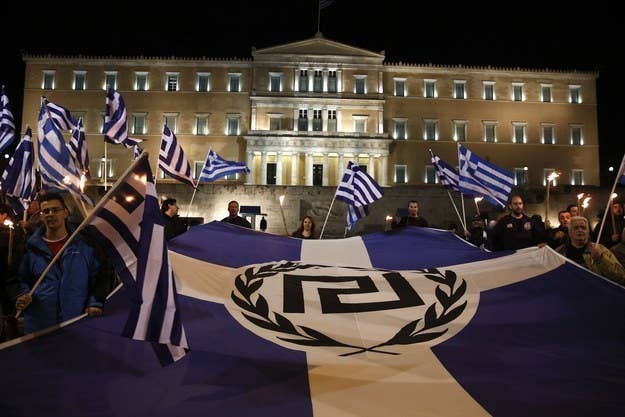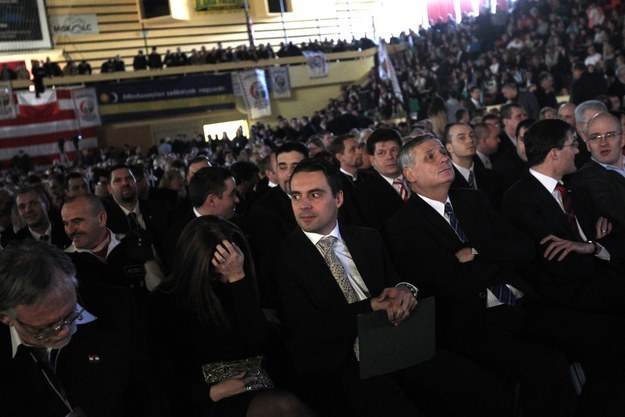
This weekend's European elections delivered one clear message. Across the continent, voters have not simply fallen out of love with Europe - many want to see it broken up. Years of recession, soaring unemployment, and lackluster leadership have left the public with little faith that the elite can solve their problems. Many have turned in their frustration to smaller, anti-establishment parties, from the hard left to the far right. Anger with the European Union has fostered a rise in nationalism. Were these voters to get their way, this would be the last European election.
Here's a look at a few of the winners:
In France, the anti-immigrant Front National was the big winner.
View this video on YouTube
In France, the Front National, led by Marine le Pen, won easily, taking 25% of the vote. Her father, Jean-Marie le Pen, founded the party in 1972, and soon developed a reputation for anti-semitic rhetoric. Suurrounding himself with shaven-headed bodyguards, and barking neo-Nazi slogans, he could never make the political breakthrough be so desired. When his daughter took over in 2010, she saw the chance to tidy up the party's image, presenting a younger, smarter public face, while keeping its anti-immigrant ideology. Her tactics have been proved right.
The United Kingdom Independence Party wants exactly what its name suggests.
View this video on YouTube
Despite accusations of racism, incompetence, and a general tone of dismissal towards them from the political elite, the UK Independence Party (UKIP) led by Nigel Farage pulled off an historic win in Britain, taking around 28% of the vote. It was the first time in modern history that neither the Conservatives nor Labour have won a national election, and was widely seen as a wake-up call to the political elite. As the name of his party suggests, if Farage were in charge the island nation would sail away from Europe, proudly flying the Union Jack.
In Greece, a radical left-wing party won, but neo-Nazis continued their rise.
View this video on YouTube
Greece has been mired in recession for years, crushed by the collapse of its banking system, and mired in allegations of political corruption in the two mainstream parties. Tied to the euro, its future has been left largely in the hands of European policymakers. This weekend, the leftwing Syriza movement led by Alexis Tsipras, took around 27% of the vote, in a clear rejection of the austerity measures imposed by the EU.
Meanwhile, the neo-fascist party, Golden Dawn, won 10% of the vote, and looks set to take up three seats in the European parliament, bringing them into the heart of the establishment. Its leadership has been accused of everything from murder to inciting and carrying out racial violence, and possession of illegal weapons. In fact, the party’s boss, Nikos Michaloliakos, is in so much trouble he had to send his congratulatory message to supporters from a prison cell in the Greek capital, where he is awaiting trial for running a criminal gang.
Germany has voted for its first neo-Nazi MEP.
View this video on YouTube
Given that Germany is Europe’s wealthiest, most powerful country, with low rates of unemployment and the dominant player in the EU, it is no surprise that Chancellor Angela Merkel’s Christian Democrats won at the polls. But there were some truly shocking results buried beneath her victory: not only did the first Eurosceptic party – The Alternative for Germany – win seats, but a proudly neo-Nazi MEP from from the National Democratic party of Germany will also sit in Strasbourg for the first time.
Hungarians mostly chose between the right ... and the far-right.

Turnout was low in Hungary, suggesting a general voter apathy towards the European Union, and the two parties that came out on top were from the right and the far-right. The governing Fidesz party, which has often been at loggerheads with the EU, took more than 50% of the vote, but the radical nationalist Jobbik party solidified its position as a major political force, coming second.
The Danish People's Party came out on top with its anti-immigrant rhetoric.
Morten Messerschmidt, a new Far right MEP in Denmark, once heiled Hitler and sang Nazi songs on Hitler's birthday
Other Europeans broadly regard Denmark as an ordered, calm country – inoffensive almost. But this weekend saw the far-right Danish People's Party take 27% of the vote, on a platform of anti-immigrant rhetoric, tighter border controls and calls for a curb on benefits to EU migrants living in Denmark. Its leader, Morten Messerschmidt, is seen as both charismatic and untrustworthy – a potentially devastating combination in a populist leader.
Why does it matter?
The European Parliament is more powerful than ever, with responsibilities including choosing the President of the European Commission, deciding how to spend its €1tn budget, addressing the growing privacy challenges posed by Facebook and Google, and deciding whether to support a trade deal with the United States. Despite its powers, these European elections have shown that it has never been more unpopular.




